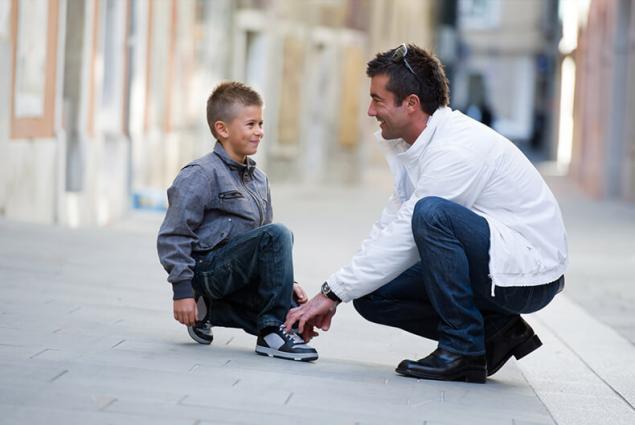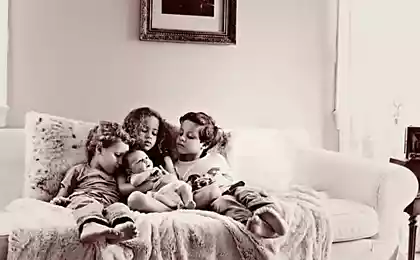205
How to Answer Inconvenient Questions from Children
Normally I don’t get into my pocket, but there are times when kids ask something that I have nothing to answer. I am thrilled that they explore the world with such curiosity, and I have always encouraged them to share their feelings and ask. So why am I so nervous when difficult questions happen? Maybe we all worry about this because we think we have to give the perfect answer every time.

“But it’s okay to say, ‘Oh, that’s a good question, let me think,’ and we’ll talk about it later.” The main thing is that later you really come back to it. — Wayne Flazig, Ph.D. and child psychologist. But if you’re tired or stressed, it’s easy to get away with the standard excuses you hated when you were kids. In this article, you can borrow some ideas in case your children ask you unexpected questions or say something that makes you feel uncomfortable.
Why do you have to go to work?
Your child doesn’t really want to hear a list of reasons. He just doesn’t want you to leave, he wants you to stay with him. Instead of explaining that you work, you get paid the salary you buy food for, give your child the right to feel that way and shift the conversation to something more positive.
You can say, for example, “I know you wish I didn’t have to go there!” or “When I leave, I think of you” or “I have a picture of you on my desk that reminds me that I’ll see you soon.” Don’t tell your child that you don’t want to work. “It can lead a child to believe that work is not fun,” says Betsy Brown, a child behavioral and developmental expert and author of Tell Me What to Say.
You can also add, “I like the work and the people I work with.” If your child keeps asking why other parents stay at home with their children and you don’t, you might say, “Every family decides what’s best for them,” or “There are many other things I do.” I'm a mom, I'm a wife, I'm... All this takes time.”
Everyone has it. Why don't I?
Children are very ardent arguers. “A child tortures you with the fact that it will be convincing, incredibly persistent to ask for something over and over again,” says consultant Wendy Mogel, Ph.D., author of The Happiness of a Teared Knee. Try to hold on to anger and notation about how much your child already has.
You might say, I know how much you want that Star Wars saber. Let's give it to you for your birthday or you can save your pocket money for it," or "Yes, Ashley has an iPhone, but every family chooses for themselves. If your child’s request turns into endless whining, add that “the topic is closed” or that “You’re done talking about it.”
Are we rich?
Most young children don't know what "rich" really means, and their questions about finances actually grow out of comparison (another kid on the playground bragged about having a lake holiday home) or they might worry (if dad loses his job, will we have nowhere to live?)
Ask your child what it means to be rich. He could hear you talking about money problems or losing your job and worrying about it. On the other hand, maybe he just wants to be able to buy everything he wants. Once you determine what caused this question, you can answer it most accurately.
If you’re in a difficult financial situation, try saying, “We need to be careful not to spend money on things we don’t need right now.” But don’t worry, we will always take care of you. If your child wants to know more, tell them that you have more money than some people, but less than others. You can also say that you have enough money to live as you want and do what you like.

Why don't some people like me?
It’s not easy for parents to hear this, but try not to over-emotionalize or disregard your child’s feelings by saying, “What nonsense!” Of course they love you! says Robin Berman, a doctor and author of Parent Allowed: How to Raise a Child with Love and Rules.
If you deny your child’s feelings, they won’t go away. It is best to encourage children to talk about how they feel and why. You want to know what’s going on: whether no one has played with your child during recess, or whether no one ever plays with your child.
To find out, you'd better say something like, "Tell me more about this," or ask, "What happened, why do you think so?" In addition, you can support the child: “It must make you sad and angry.” Asking, “What do you think you can do?” will help your child find a solution.
You want him to learn how to cope with his feelings and social difficulties. Being able to do this is a very important life skill, says Dr. Berman. Share your childhood memories with your child to help them understand that everyone feels rejected from time to time and overcomes it. Also, talk to your teacher to make sure you have accurate information and your child doesn’t do anything that repels classmates.
Will the flood flood flood our house?
Bad news spreads quickly. Experts argue that children under 7 should be protected from television news and table talk about natural disasters and tragedies. At any age, children can instantly read your reaction. So first find out what exactly your child heard by asking, “Tell me, what do you know?”
Acknowledge your child’s feelings by saying, I know you’re worried our home will be affected by a wildfire/hurricane/earthquake. That will not happen, it is far from here.”
“If you don’t, lying won’t help you,” says Betsy Brown, “but depending on your child’s age and maturity, you don’t have to tell them everything.” Literally, you need to tell him the following: “I am in control of the situation and will do everything possible to make sure that everything is okay with you.” To sound more convincing, we can add that everyone: police, firefighters, teachers and doctors work to ensure that no one gets hurt.
Is Grandma gonna die soon?
“It’s always a bad idea to hide a serious illness or death because your child is too young for bad news,” says Betsy Brown, “Children know when we’re worried, and if we don’t explain what’s going on, they may think it’s their fault.”
If you have to talk about the fact that someone is very sick and can die, wait until you can control your emotions. You might say, "Grandma has a health problem, but we hope she gets better and lives a long time." We don't know for sure, but doctors are doing everything they can to help her. They take good care of her.”
Another way to put it is, “Grandma has cancer, some types of this disease can be cured, and some cannot. She has just one and she could die.” Be prepared for the next question, the worst childhood nightmare, “Are you going to die too?” Soothe your child by saying, “I’m not going to die for a very long time.” I have a healthy body and I take care of it, and I'll be your mom when you go to school, when you go to summer camp, when you're in high school and when you're a student.
163480
Are you and Dad going to get divorced?
Your marriage is a model that your child will use to build their own relationships when they grow up. Having kids ask questions like this means you need to find a way to fix your disagreements with your spouse. “Use the situation to show that people who love each other may have differences, but they can solve problems with love and respect,” Fleizig said.
When there is more conflict in the family, it can scare the child, so explain to him that it is not about divorce and calm him down. Thank your children for reminding you that quarrels hurt everyone, and promise to try to solve problems peacefully.
If you are truly divorced, it is better to explain everything to your children together with your spouse: “We do not get along with each other.” We tried our best to do that, but we decided it would be better not to live together.” Explain to your child where each family member will live and be sure to stress, “That doesn’t mean you did anything wrong.” We will always love you and remain your parents. It will be hard for all of us to get used to it, but we will do everything we can to get you through it.”
What if you changed your mind about the question you were answering or didn’t say what you wanted? Go back to that conversation, even if a day or a week has passed, and say, “I was thinking about what we were talking about then, and this is what I really wanted to say.” Thinking about your relationship with your child means more than you think. published
READ ALSO: 10 things you shouldn't say to a good grandmother
Raising from a millionaire mother: 6 useful tips
P.S. And remember, just changing our consumption – together we change the world!
Join us on Facebook, VKontakte, Odnoklassniki
Source: www.matrony.ru/kak-otvechat-na-neudobnyie-voprosyi-detey/

“But it’s okay to say, ‘Oh, that’s a good question, let me think,’ and we’ll talk about it later.” The main thing is that later you really come back to it. — Wayne Flazig, Ph.D. and child psychologist. But if you’re tired or stressed, it’s easy to get away with the standard excuses you hated when you were kids. In this article, you can borrow some ideas in case your children ask you unexpected questions or say something that makes you feel uncomfortable.
Why do you have to go to work?
Your child doesn’t really want to hear a list of reasons. He just doesn’t want you to leave, he wants you to stay with him. Instead of explaining that you work, you get paid the salary you buy food for, give your child the right to feel that way and shift the conversation to something more positive.
You can say, for example, “I know you wish I didn’t have to go there!” or “When I leave, I think of you” or “I have a picture of you on my desk that reminds me that I’ll see you soon.” Don’t tell your child that you don’t want to work. “It can lead a child to believe that work is not fun,” says Betsy Brown, a child behavioral and developmental expert and author of Tell Me What to Say.
You can also add, “I like the work and the people I work with.” If your child keeps asking why other parents stay at home with their children and you don’t, you might say, “Every family decides what’s best for them,” or “There are many other things I do.” I'm a mom, I'm a wife, I'm... All this takes time.”
Everyone has it. Why don't I?
Children are very ardent arguers. “A child tortures you with the fact that it will be convincing, incredibly persistent to ask for something over and over again,” says consultant Wendy Mogel, Ph.D., author of The Happiness of a Teared Knee. Try to hold on to anger and notation about how much your child already has.
You might say, I know how much you want that Star Wars saber. Let's give it to you for your birthday or you can save your pocket money for it," or "Yes, Ashley has an iPhone, but every family chooses for themselves. If your child’s request turns into endless whining, add that “the topic is closed” or that “You’re done talking about it.”
Are we rich?
Most young children don't know what "rich" really means, and their questions about finances actually grow out of comparison (another kid on the playground bragged about having a lake holiday home) or they might worry (if dad loses his job, will we have nowhere to live?)
Ask your child what it means to be rich. He could hear you talking about money problems or losing your job and worrying about it. On the other hand, maybe he just wants to be able to buy everything he wants. Once you determine what caused this question, you can answer it most accurately.
If you’re in a difficult financial situation, try saying, “We need to be careful not to spend money on things we don’t need right now.” But don’t worry, we will always take care of you. If your child wants to know more, tell them that you have more money than some people, but less than others. You can also say that you have enough money to live as you want and do what you like.

Why don't some people like me?
It’s not easy for parents to hear this, but try not to over-emotionalize or disregard your child’s feelings by saying, “What nonsense!” Of course they love you! says Robin Berman, a doctor and author of Parent Allowed: How to Raise a Child with Love and Rules.
If you deny your child’s feelings, they won’t go away. It is best to encourage children to talk about how they feel and why. You want to know what’s going on: whether no one has played with your child during recess, or whether no one ever plays with your child.
To find out, you'd better say something like, "Tell me more about this," or ask, "What happened, why do you think so?" In addition, you can support the child: “It must make you sad and angry.” Asking, “What do you think you can do?” will help your child find a solution.
You want him to learn how to cope with his feelings and social difficulties. Being able to do this is a very important life skill, says Dr. Berman. Share your childhood memories with your child to help them understand that everyone feels rejected from time to time and overcomes it. Also, talk to your teacher to make sure you have accurate information and your child doesn’t do anything that repels classmates.
Will the flood flood flood our house?
Bad news spreads quickly. Experts argue that children under 7 should be protected from television news and table talk about natural disasters and tragedies. At any age, children can instantly read your reaction. So first find out what exactly your child heard by asking, “Tell me, what do you know?”
Acknowledge your child’s feelings by saying, I know you’re worried our home will be affected by a wildfire/hurricane/earthquake. That will not happen, it is far from here.”
“If you don’t, lying won’t help you,” says Betsy Brown, “but depending on your child’s age and maturity, you don’t have to tell them everything.” Literally, you need to tell him the following: “I am in control of the situation and will do everything possible to make sure that everything is okay with you.” To sound more convincing, we can add that everyone: police, firefighters, teachers and doctors work to ensure that no one gets hurt.
Is Grandma gonna die soon?
“It’s always a bad idea to hide a serious illness or death because your child is too young for bad news,” says Betsy Brown, “Children know when we’re worried, and if we don’t explain what’s going on, they may think it’s their fault.”
If you have to talk about the fact that someone is very sick and can die, wait until you can control your emotions. You might say, "Grandma has a health problem, but we hope she gets better and lives a long time." We don't know for sure, but doctors are doing everything they can to help her. They take good care of her.”
Another way to put it is, “Grandma has cancer, some types of this disease can be cured, and some cannot. She has just one and she could die.” Be prepared for the next question, the worst childhood nightmare, “Are you going to die too?” Soothe your child by saying, “I’m not going to die for a very long time.” I have a healthy body and I take care of it, and I'll be your mom when you go to school, when you go to summer camp, when you're in high school and when you're a student.
163480
Are you and Dad going to get divorced?
Your marriage is a model that your child will use to build their own relationships when they grow up. Having kids ask questions like this means you need to find a way to fix your disagreements with your spouse. “Use the situation to show that people who love each other may have differences, but they can solve problems with love and respect,” Fleizig said.
When there is more conflict in the family, it can scare the child, so explain to him that it is not about divorce and calm him down. Thank your children for reminding you that quarrels hurt everyone, and promise to try to solve problems peacefully.
If you are truly divorced, it is better to explain everything to your children together with your spouse: “We do not get along with each other.” We tried our best to do that, but we decided it would be better not to live together.” Explain to your child where each family member will live and be sure to stress, “That doesn’t mean you did anything wrong.” We will always love you and remain your parents. It will be hard for all of us to get used to it, but we will do everything we can to get you through it.”
What if you changed your mind about the question you were answering or didn’t say what you wanted? Go back to that conversation, even if a day or a week has passed, and say, “I was thinking about what we were talking about then, and this is what I really wanted to say.” Thinking about your relationship with your child means more than you think. published
READ ALSO: 10 things you shouldn't say to a good grandmother
Raising from a millionaire mother: 6 useful tips
P.S. And remember, just changing our consumption – together we change the world!
Join us on Facebook, VKontakte, Odnoklassniki
Source: www.matrony.ru/kak-otvechat-na-neudobnyie-voprosyi-detey/
























